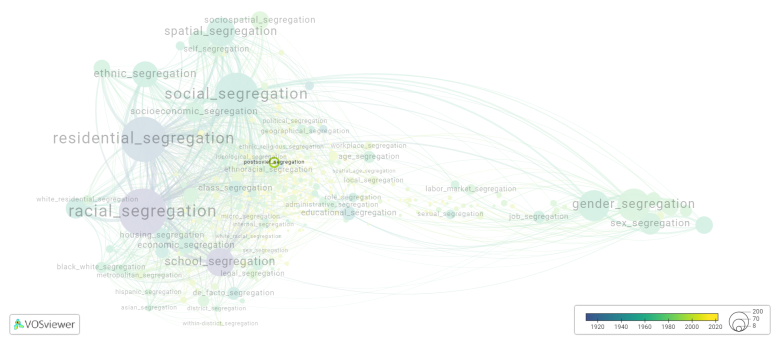Postsoviet segregation: Difference between revisions
(Creating page) |
(Creating page) |
||
| (One intermediate revision by the same user not shown) | |||
| Line 18: | Line 18: | ||
Efforts to address post-Soviet segregation have included promoting inclusive policies, minority rights, economic development programs, and attempts to bridge ethnic and social divides. However, the legacy of the Soviet era and the complexities of managing diverse populations continue to present challenges to achieving true integration in post-Soviet societies. | Efforts to address post-Soviet segregation have included promoting inclusive policies, minority rights, economic development programs, and attempts to bridge ethnic and social divides. However, the legacy of the Soviet era and the complexities of managing diverse populations continue to present challenges to achieving true integration in post-Soviet societies. | ||
===== Synonyms ===== | ===== Synonyms ===== | ||
The following terms are synonymous with: | The following terms are synonymous with postsoviet segregation: | ||
post soviet segregation. | post soviet segregation. | ||
| Line 30: | Line 30: | ||
[[File:postsoviet_segregation.png|780x780px]] | [[File:postsoviet_segregation.png|780x780px]] | ||
This visualization is based on the study [[Segregation_Wiki:About| The Multidisciplinary Landscape of Segregation Research]]. | |||
For the complete network of | For the complete network of interrelated segregation forms, please refer to: | ||
* | * [https://tinyurl.com/2235lkhw First year of publication] | ||
* | * [https://tinyurl.com/2d8wg5n3 Louvain clusters] | ||
* | * [https://tinyurl.com/223udk5r Betweenness centrality] | ||
* | * [https://tinyurl.com/244d8unz Disciplines in which segregation forms first emerged (Scopus database).] | ||
==References== | ==References== | ||
==Notes== | ==Notes== | ||
Latest revision as of 07:17, 16 October 2024
Date and country of first publication[1][edit | edit source]
2006
Sweden; Estonia
Definition[edit | edit source]
Post Soviet segregation refers to the division or separation of different ethnic or social groups within the countries that emerged from the collapse of the Soviet Union. After the dissolution of the USSR in 1991, newly independent states faced numerous challenges in managing their diverse populations and addressing historical divisions and conflicts.
Segregation in the post Soviet context can be observed in various forms:
1. Ethnic Segregation: The breakup of the Soviet Union led to the emergence of multiple independent states with significant ethnic diversity. Ethnic tensions and conflicts, which had been suppressed during the Soviet era, resurfaced in many areas. This often led to the separation of different ethnic groups, either voluntarily or due to forced migrations. For example, during the conflicts in the early 1990s, ethnic Russians in Baltic states experienced segregation and discrimination.
2. Socio-Economic Segregation: The transition from a planned to market economy resulted in significant disparities in wealth and opportunities. Social and economic segregation became evident, with a small proportion of the population experiencing economic growth and upward mobility, while many others faced unemployment and poverty. This division contributed to the emergence of an affluent class along with a marginalized and economically disadvantaged class.
3. Geographic Segregation: The collapse of the Soviet Union exposed regional divisions and disparities that had been previously masked by the centralized system. In several post-Soviet countries, there are significant regional differences in development, infrastructure, and living standards. These disparities have led to geographical segregation, with certain regions lagging behind while others experience more progress and prosperity.
4. Political Segregation: The transition to democracy and the establishment of new political systems in post-Soviet states often resulted in the concentration of power in the hands of certain groups or elites. This has led to a separation between those in power and ordinary citizens, creating a sense of exclusion and marginalization among certain segments of society.
Efforts to address post-Soviet segregation have included promoting inclusive policies, minority rights, economic development programs, and attempts to bridge ethnic and social divides. However, the legacy of the Soviet era and the complexities of managing diverse populations continue to present challenges to achieving true integration in post-Soviet societies.
Synonyms[edit | edit source]
The following terms are synonymous with postsoviet segregation:
post soviet segregation.
References and literature addressing this segregation form under these synonymous terms can be found below.
See also[edit | edit source]
Related segregation forms[edit | edit source]
Postsoviet segregation is frequently discussed in the literature with the following segregation forms:
residential segregation, social segregation, ethnic segregation

This visualization is based on the study The Multidisciplinary Landscape of Segregation Research.
For the complete network of interrelated segregation forms, please refer to:
References[edit | edit source]
Notes[edit | edit source]
- ↑ Date and country of first publication as informed by the Scopus database (December 2023).
At its current state, this definition has been generated by a Large Language Model (LLM) so far without review by an independent researcher or a member of the curating team of segregation experts that keep the Segregation Wiki online. While we strive for accuracy, we cannot guarantee its reliability, completeness and timeliness. Please use this content with caution and verify information as needed. Also, feel free to improve on the definition as you see fit, including the use of references and other informational resources. We value your input in enhancing the quality and accuracy of the definitions of segregation forms collectively offered in the Segregation Wiki ©.
Postsoviet segregation appears in the following literature[edit | edit source]
Gentile M., Tammaru T. (2006). Housing and ethnicity in the post soviet city: Ust' Kamenogorsk, Kazakhstan. Urban Studies, 43(10), 1757-1778. https://doi.org/10.1080/00420980600838150
Sharipova M., Fábián K. (201). From Soviet liberation to post soviet segregation: Women and violence in Tajikistan. Domestic Violence in Postcommunist States: Local Activism, National Policies, and Global Forces, 133-170. Indiana University Press.https://doi.org/
